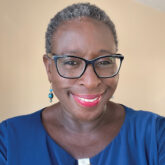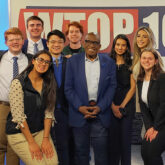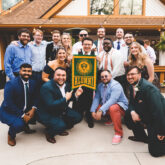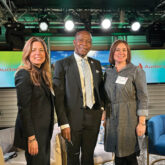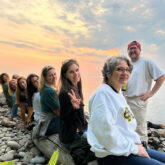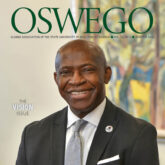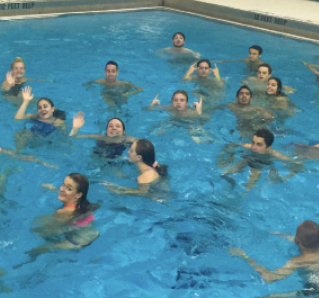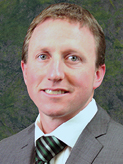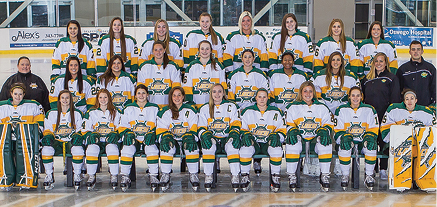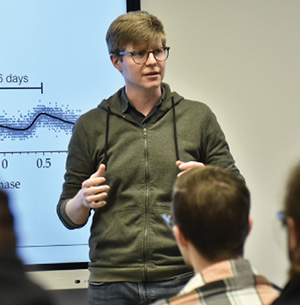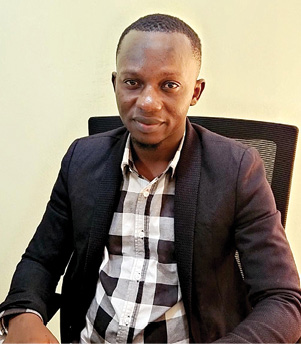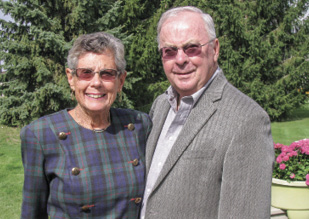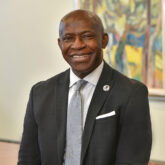Anne Sarkissian DeRue ’04 was coming off an impressive junior year season of swimming at Oswego High School, and she was ready to secure an athletic scholarship during an even better senior year.
It was the first day of practice, and DeRue was lying on the grass beside her teammates ready to count out each sit up as prompted by her coach.
“She said, ‘When I say up, you say one,’” DeRue recalled. “That’s the last thing I remember before I woke up in the ambulance.”
She soon discovered that she had a brain tumor and needed surgery. Her dreams of a record-breaking senior season were eclipsed by the harsh reality of this more immediate concern.
“I remember asking the doctor, ‘Can’t we wait until after swim season to do the surgery?’” said DeRue, who is now a high school math teacher in Fulton. “But that wasn’t possible. I was devastated.”
She fought her way back into the pool before the end of October. Despite not being able to dive into the pool, do flip-turns or swim butterfly—her strongest event—she qualified for sectionals.
She chose to enroll at SUNY Oswego to stay with her club swim coach, Kami Mathews Gardner, who also coached the Oswego Lakers swimming and diving teams. In her four years at Oswego, DeRue was a 12-time All-American in swimming, and became arguably the most decorated athlete in school history. She set six school records—five of which still stand today.
“I learned to be patient and to set realistic goals,” DeRue said. “I learned not to give up when things get tough and to never lose sight of my goals. Today, I draw on these life experiences and share them with my students. They just have to keep trying.”
DeRue’s experiences as a student-athlete reflect many of the characteristics of other Lakers athletes: resiliency, perseverance, dedication, drive, loyalty, passion, leadership, discipline and courage, to name a few.
Positive Impact
These words are not simply platitudes. They guide these individuals’ actions throughout their lives.
“As we celebrate Title IX’s 40th anniversary, we renew our commitment to providing opportunities for all of our students to live with a healthy mind, body and spirit,” said college President Deborah F. Stanley. “Our current and former athletes embody many of the qualities we hope all of our college community members strive to emulate.”
“One of the biggest lessons I learned from my time at Oswego was how powerful words can be,” said lacrosse player Greg Peel ’94.
He recalled how his coaches said that if he continued to work hard, he could become an All-American lacrosse player—a prophecy he fulfilled his senior year.
“For someone to tell me that I could achieve that type of success was really motivating,” said Peel, who was an All-American swimmer and what he described as an “average” lacrosse player in high school. “Their positive reinforcement, the encouragement and the positive attitude had a huge impact on my life. Oswego was the perfect bridge from home to the professional world.”
Now as the senior director of HRS sales at Paychex in Dallas, Peel said he tries to develop a culture similar to what he had at Oswego.
“Fortunately, I had an opportunity to observe Coach Dan Witmer ’82 M’87 leading us in an environment where there’s loyalty, respect and strong work ethic,” he said. “I’ve found that mirroring him—by engaging people, allowing employees’ voices to be heard and making decisions collectively like we did on the lacrosse team—can move a good team to a great team.”

Joe Jones ’87 M’89, Boston University head men’s basketball coach, said he regularly draws
on the lessons learned at SUNY Oswego when working in his current Division I program.
Boston University Men’s Head Basketball Coach Joe Jones ’87 M’89 said he incorporated key elements of the Lakers athletic culture into the programs he has developed with his Division I players.
“My philosophy really goes back to my days at Oswego,” said Jones, who played Lakers basketball for four years, including two years as captain. “I was fortunate to have a great coach and someone who was a great mentor, father figure and friend—Paul Callaghan. He helped mold me and develop me as a basketball player, as a student and as a person. My philosophy is to have my guys here at BU have a good idea of who they are, and what they want to do when college is over.”
Jones credits a conversation with Coach Callaghan with putting him on track to earn a master’s degree at SUNY Oswego and to become a guidance counselor, a career he loved. When the chance to transition into a college level basketball coach arose, he couldn’t pass up the opportunity.
Finding Balance
Jones developed a mission statement at BU that “strives to be a championship level program in the classroom, in the community and on the court through accountability, effort and loyalty.” He said it was a conscious decision to put “in the classroom” before “on the court.”
Being able to balance academics and athletics is one of the qualities that attracted some of the best student-athletes to Oswego.
Joe L. Farmer ’60, a standout athlete in several sports in high school, said he received a scholarship to play Division I football at Syracuse University, but the college didn’t offer a strong academic program in industrial arts teaching.
“While the football scholarship afforded me the opportunity to attend college, my major focus was always academics first, as I knew academics had the steam to take me where I always aspired to be, which was teaching,” Farmer said. “I also learned to focus on both academia and sports and how to incorporate sportsmanship within my teaching career and pass that knowledge on to my students for years to come.”
Farmer contributed to both the track and field and wrestling teams during his four years at Oswego, holding the records for the shot put and discus and being named the Wilkes Regional wrestling champion in 1959. He finished his highly successful undergraduate wrestling career with a record of 48 wins and one loss.
He went on to have a successful career as a teacher, guidance counselor, principal and then superintendent, as well as city councilman of Yonkers.
“What I learned from sports is you get out what you put into it,” Farmer said. “I believe that in any sport or profession, it’s the commitment, dedication and level of preparedness that increase your chances of achieving your goals. These lessons directly related to my athletics experiences, and I was able to share them with large numbers of students throughout my career.”
About D3 Student-Athletes
- Report active academic engagement and participation in academic “extras,” such as research with faculty, study abroad opportunities and capstone/senior thesis projects.
- Report significantly greater gains in time management when compared with non-athletes.
- Report greater involvement in volunteering.
- Are more likely to report that they see themselves as part of
the campus community.- Three-quarters of all student-athletes in Division III receive some form of grant or non-athletics scholarship.
’Full Spectrum of College Life’
Brian McGann ’70 credits his participation on the wrestling team as the reason he returned to college and finished his degree after taking a two-year hiatus and enlisting in the U.S. Marine Corps Reserves.
“My first two years at Oswego I did very well on the wrestling team, 22-0,” said the 1969 All-American wrestler and SUNYAC champion. “But that wasn’t good enough for Oswego. They said, ‘We do have some academic standards.’ And I learned that it’s not just about sports. It’s about the whole person.”
That’s exactly the lesson that Athletic Director Sue Viscomi hopes that all Oswego student-athletes learn.
While some DI college athletes today are looking to unionize, some student-athletes are embracing Division III athletics program’s more balanced approach to education
and athletics.
“Students who participate in D3 take part in highly competitive athletics programs but retain the full spectrum of college life,” Viscomi said. “Academics is the primary focus. We have shorter practice and playing seasons. We have more restrictive eligibility rules, and regional competitions minimize the time students are away from their academic studies and keep students on the path to graduation.”
It’s a mindset that is paying off for Lakers student-athletes, who maintain an average GPA of 3.1—slightly higher than the general student body average of 3.0. Oswego student-athletes also maintain a higher graduation rate of approximately 68 percent compared
to 57 percent for non-athletes.
Lakers athletes say that playing college sports requires excellent time management and organizational skills, especially for someone like Shirleen Dubuque ’85 who played three varsity sports: field hockey, basketball and softball.
“Playing a college sport with a very full class schedule all require diligence and persistence—attributes that will help anyone in anything that they do,” said Dubuque, a psychology major with a double minor in coaching and sports medicine, who owned and operated a pet store in Stratford, Conn., until she consolidated with another store last fall. “In order to be a successful athlete and student, effective time management is critical. It’s been said, if you want something done, ask a busy person. They will always find a way to fit it into their schedule.”
Maybe that’s why college athletes are so attractive to employers.
A 2013 study at Sheffield Hallam University’s Sports Industry Research Center showed that 94 percent of employers recognize the benefits of playing sports in developing career-enhancing skills. The study also indicated that alumni-athletes earn 18 percent more than their counterparts and are less likely to be unemployed.
Mike Howard ’90, Oswego’s wrestling and men’s golf coach, can rattle off several names of his former players who said their participation in a college sport made the difference in landing a job.
“It makes sense,” Howard said. “These are individuals who can multitask, who are driven and self-motivated. They learn how to fail and pick themselves up again. They are used to performing under pressure and will find a way to get it done for the team. Who wouldn’t want them as employees?”
Managing Expectations and Goals
Many alumni-athletes recognize how their experience in college sports directly affects their professional work.
As an investigator with Oswego County Child Protective Services, Lakers soccer standout Missy Verdoliva ’99 employs her knowledge of teamwork to develop and articulate a shared goal that all parties can work toward accomplishing.
“The common goal that most families and the department want is to keep a child safe,” Verdoliva said. “So I try to help focus everyone on how we can maneuver whatever is happening in the family’s life at a given time toward that common goal—making sure that the children are safe and that their needs are met. I definitely think the leadership, sportsmanship, comradery and goal-setting that I learned through soccer helps me in my work.”
Derek Dunning ’09 draws on his experience as a former cross-country runner on a daily basis in his role as director of sports information at Norwich University in Northfield, Vermont.
One moment at Oswego stands out from his college career—taking fourth place at SUNYACs.
“Obviously we would have loved to have run for the overall title,” Dunning said. “We knew that wasn’t possible. We set a reasonable goal. We overcame the muddy, wet course conditions and wanted a little bit more. I think a lot of other teams saw the course and just shut down. But we set our minds to it, and said this is what we’re going to do, and we did it. I don’t think another team has been happier to finish fourth in a contest.”
He said the competitive drive, time management, mental toughness and goal setting come in handy as he is juggling the competing demands from 20 varsity teams for coverage of their events and is pushing his department to incorporate new technologies such as video streaming.
Dunning’s experience with cross country also carries into his personal life and interests. After years away from running, he decided to set a goal for himself—to qualify for the 2015 Boston Marathon. He did so during the Vermont City Marathon in Burlington and plans to run April 20 in the Boston race.
“Setting this goal helped me to realize to make time for things you want to do in life,” he said.
Knowledge for Life
Former Oswego State women’s basketball player, mother and retired Tompkins County (N.Y.) probation officer Eileen Sommers ’83 said college athletes have pretty clear ideas about who they are and where they fit into the world.
“Athletes tend to be people who want to be challenged, and who want to see progress, for themselves as well as for the team,” Sommers said. “My work experiences were greatly helped by my desire to work as a team, to share in the hard times and rejoice in the good times. As a parent and as a supervisor, you are kind of like a coach on a team of people who need to work together to get the job done.”
Playing college sports also helps individuals develop good habits that often last a lifetime.
Although he graduated 45 years ago, McGann said the trainings he did as a student-athlete have helped him recover quicker from surgeries and illnesses as he ages.
“I go on machines at the gym and feel like I can work out intelligently,” he said. “I know that wrestling has helped me in having more due diligence in rehabilitation and to work
the weaker parts of my body.”
Farmer, who will celebrate his 55th college reunion in June, said he has made it a point to always remain active.
“Even today as a retired person, my involvement in athletics is still influencing me,” Farmer said. “I know that my body—which is my temple—has to be in the best possible condition that I can keep it in, in order to maintain a good, healthy lifestyle at this stage. And I believe that had a lot to do with the athletics and the sports.
“In fact, I believe that exercising your mind in preparation for life’s many challenges and having the ability to remain focused on where you see yourself for the long haul are what carry you through; on and off the athletic field or the mat,” Farmer said. “That mindset has shaped who I am.”
One of the biggest lessons Jones said he learned on the basketball court was to make the most of life—even as the time ticks down on the shot clock.
“You have to enjoy the time you have, every experience,” he said. “Win or lose. You want to look back and not have any regrets. That’s what life is all about.”
Editor’s note: The following individuals in this article are members of the Oswego Athletic Hall of Fame: Anne Sarkissian DeRue ’04, Shirleen Dubuque ’85, Joe L. Farmer ’60, Brian McGann ’70, Greg Peel ’94, Eileen Sommers ’83 and Missy Verdoliva ’99.
You might also like
More from Alumni Profiles
Astrophysicist, Yale Professor Credits Oswego with Setting His Course for Stellar Career
Astrophysicist, Yale Professor Credits Oswego with Setting His Course for Stellar Career Earl Bellinger ’12 is one stellar guy. A quick review …
BHI Alumnus from Liberia Gains World of Experience
BHI Alumnus from Liberia Gains World of Experience Otis Gbala M’23 became the first SUNY Oswego graduate who studied from Liberia …
Couple’s Loyal Support for Oswego Spans Five Decades
Couple’s Loyal Support for Oswego Spans Five Decades Marilynn “Lynn” Nagy Farrar ’61 and Neil Farrar cherish their memories of Oswego …

